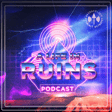
Community Connections with Jessica Ericson and Jasmine Saxon - Ep 153
On this episode of A Life in Ruins, we are lucky to be joined by the co-founders of Community Connections LLC, Jessica Ericson and Jasmine Saxon. Community Connections is a Historical Consulting Company based out of Denver. We start out talking about their first experiences with archaeology and anthropology and then delve into the origins of Community Connections. They detail what kind of projects they work on and we end the conversation talking about what events they have coming up.
If you have left a podcast review on iTunes or Spotify, please email us at alifeinruinspodcast@gmail.com so we can get shipping information to send you a sticker.
If you are listening to this episode on the "Archaeology Podcast Network All Shows Feed," please consider subscribing to the "A Life in Ruins Podcast" channel to support our show. Listening to and downloading our episodes on the A Life in Ruins channel helps our podcast grow. So please, subscribe to the A Life in Ruins Podcast, hosted by the Archaeology Podcast Network, on whichever platform you use to listen to us on the "All Shows Feed." Please support our show by following our channel.
Transcripts
For rough transcripts of this episode go to https://www.archpodnet.com/ruins/153
Links
Literature Recommendations
- Archaeology and Community Service Learning edited by Michael S. Nassaney and Mary Ann LevineEthical Issues in Archaeology edited by Larry J. Zimmerman, Karen D. Vitelli and Julie Hollowell-Zimmer
Guest Contact
- Instagram/Facebook: @communityconnectionsllc
Contact
- Email: alifeinruinspodcast@gmail.com
- Instagram: @alifeinruinspodcast
- Facebook: @alifeinruinspodcast
- Twitter: @alifeinruinspod
- Website: www.alifeinruins.com
- Ruins on APN: https://www.archaeologypodcastnetwork.com/ruins
- Store: https://www.redbubble.com/people/alifeinruins/shop
ArchPodNet
- APN Website: https://www.archpodnet.com
- APN on Facebook: https://www.facebook.com/archpodnet
- APN on Twitter: https://www.twitter.com/archpodnet
- APN on Instagram: https://www.instagram.com/archpodnet
- Tee Public Store
Affiliates
- Motion
- Motley Fool
Save $110 off the full list price of Stock Advisor for your first year, go to https://zen.ai/pseudofool and start your investing journey today!
*$110 discount off of $199 per year list price. Membership will renew annually at the then current list price.
